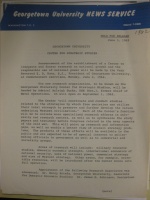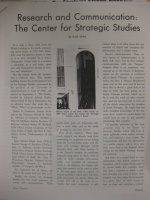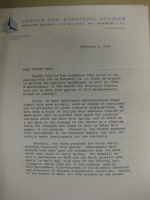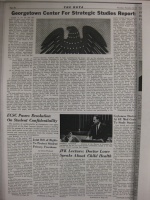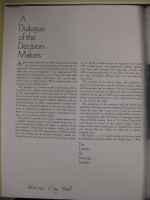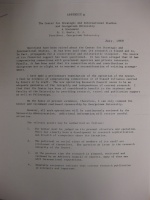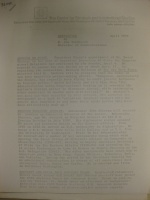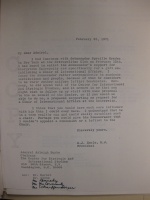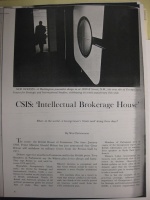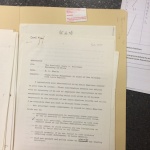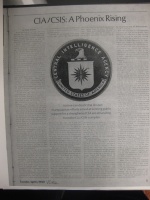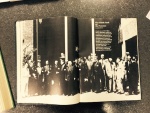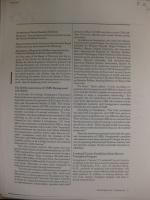Difference between revisions of "Center for Strategic and International Studies, timeline"
Richard Bew (talk | contribs) |
Richard Bew (talk | contribs) |
||
| Line 127: | Line 127: | ||
==Notes== | ==Notes== | ||
<references/> | <references/> | ||
| − | [[Category: | + | [[Category:]] |
Revision as of 09:14, 31 March 2016
This timeline records key events in the history of the CSIS, in particular from the period of its creation until it was removed from campus at Georgetown University in 1986.
Contents
1962
June
- The announcement of the establishment of The Centre for Strategic (and International) Studies was made by Reverend E.B Bunn, President of Georgetown University on June 4 1962. Its stated aim was 'to coordinate and conduct studies related to the strategies by which free societies can utilise their total strength to preserve and further develop the values underlying Western civilisation.'[1]
- Donald Sheehan of the University of Pennsylvania writes to Reverend Bunn on the 23 June 1962, expressing that he was 'impressed with the need for such an independent objective agency' and that 'a university provides an ideal setting for such an organisation as you have envisioned'.[2]
1963
February
- CSIS' contribution to coordinating research and facilitating meetings between strategists and other key political actors receives press attention. [3]
1964
February
- Arleigh Burke writes to Father Campbell on 5 February 1964 regarding CSIS' move of headquarters to 1717 Massachusetts Avenue, away from Georgetown University Campus. [4]
September
- Response to Admiral Burke from Father Campbell regarding constitutional restructuring of CSIS and the Board of Director's approval on 11 September.[5]
1966
April
- Letter from Admiral Burke dated 22 April 1966, regarding a grant from the Scaife Family Foundation to help retain Professors Garbuny and Sharabi from Georgetown.[6]
September
- Admiral Burke writes to the CEO of the Automobile Manufacturers Association on 13 September 1966, asking that he sit as a member of the Executive Board.[7]
December
- Student newspaper the HOYA outlining the achievements and publications of the Centre between 1962-1966 and its prominent role in US strategy formation. [8]
1967
April
- Stirrings of student activism at Georgetown: the student populous are 'bored, respectful, disappointed and mannerly'. There are small pockets of activism emerging such as Georgetown University Community Action Program or student paper the Hoya's criticism of Father Campbell for the lack of administrative coordination between staff and students.[9]
October
- The Free University catalogue is published on 1 October by Georgetown University Students, modelled on the 40 or so other versions that had sprouted up on campuses around the country. The opening saw some 500 students join up to over 50 courses, taught by professors in their spare time and free of tuition fees.[10]
November
- The CIA opts to move job interviews from Georgetown University campus to their offices across the River Potomac. The agency claimed that it would be 'more convenient' and that this was not a direct response to rough treatment from campus protestors and potential picketing on their arrival. A student-led review requested that only designated officials may call in the police on campus protests, and Father Fitzgerald stated 'I'm in complete harmony with the idea that students should speak up and be counted'. [11]
1968
April
- The Research Council is created under the chairmanship of Professor Mosely to meet for the first time on 1 November 1968.[12]
May
- Praise is given to CSIS and it's use to the policy-practitioner in Washington, particularly to its work regarding the emerging Arab-Israeli conflict and an article in Georgetown's Alumni magazine quotes Admiral Burke as saying 'policy goes wrong becuase the alternatives are not understood at the time a decision is taken.'[13]
- Left-wing group 'Students for a Democratic Society' publish a student handbook entitled 'Not with my life you don't! - Life at Georgetown', ramping up the student activist rhetoric with passages such as 'Georgetown has a way of automatically co-opting anything sincere, of insuring nothing will disturb its highly varnished and empty shell.' [14]
November
- Correspondence between David Abshire and Father Fitzgerald, responding to the Father's criticisms of the centre's dealings. In the letter Abshire attempts to clear up some misconceptions about the CSIS' work, stating that all reports are made publicaly available, the media has very heavy involvement with the centre's work and that the centre never carries out classified or contracted research. Abshire claims it has good contact with both government officials (despite no funding) and the university itself, and even that the centre 'serves as a vehicle to bring them (the faculty) into further contact with well known scholars throughout the world'. [15]
December
- Letter from Arleigh Burke to Father Campbell from 4 December 1968 regarding the centre's name change from the Centre for Strategic Studies to the 'Centre for Strategic and International Studies' (CSIS). Father Campbell felt it important that the centre emphasise its international focus alongside that of strategy.[16]
1969
March
- During his speech at the university, Mayor Alloto of San Francisco was picketed by radical student protestors, including some members of the SDS (Students for a Democratic Society) . The Mayor was unpopular in Georgetown for his decision to quell recent demonstrations on San Francisco State campus, and around 60 students rushed the hall where he was speaking and took over the stage. Alloto said in response that 'Students have a right to be discourteous and even obnoxious, but not violent'. He went on to add that the SDS consisted of 'hardliners genuinely disturbed and prepared for rapid change within the system. You can't characterise them as bad.'[17]
June
- The Reserve Officers Training Corps (ROTC) began to attract a lot of anti-war sentiment for its presence at Georgetown, and student protestors started to interrupt training drills and picketing the group; in fact 'the changing attitude toward ROTC on the part of such student institutions as the Hoya and student academic committees showed how far mainstream sentiment at Georgetown had shifted toward a radical posture by 1969'. Pressure began to mount from both the faculty and student body regarding robust reform of the ROTC, given its special relationship with the university. Vice President Fitzgerald said of the shift in student attitudes; 'my impression is the (the undergraduate student body) is becoming radicalised'.
- President Henle issued a neutrality policy on the Vietnam war in reaction to the swelling and 'powerful force' of opposition to US policy. The 50-member strong Vietnam Moratorium Radical Caucus, sporting red armbands, storm out of Henle's address. The writer I.F Stone holds a gathering entitled 'Why Vietnam', critiquing the war and the Student Adhoc Committee for Freedom in Vietnam also held a symposium on campus. In a peace demonstration, the Hoya reports that at least 130 of those marching were enrolled at Georgetown. Again, Fitzgerald seems wary of this growth in activism - 'It is clear that we have on campus a small antagonistic group of the New Left'. [18]
- Scathing article published in the Washington Monthly, questioning the Centre's loose affiliation with Georgetown. The article quotes Father Fitzgerald as saying not other affiliates 'have so little connection with the university'. Given that the centre's research often advocated higher defence spending combined with Burke's sitting director's boards of defence contractors, it was contended that 'one is never sure...whether he is speaking as citizen Burke, retired Admiral Burke or corporate director Burke.' The centre was also accused of loading its panels and seminars: '90 per cent of the people invited to these seminars are hardline conservatives...the consensus can always be predicted'. Nicknames for the centre because of its heavily militaristic agenda take shape, including the 'Strangelovian think tank' and 'Burke's Bughouse'. The article concludes that 'industrial ties run throughout the centre's operations. Academic ties do not', summarising prevalent criticisms made at this time by Georgetown regarding their affiliation to CSIS. [19]
July
- In a statement from July 1969, President of Georgetown Father Henle outlines some of the criticisms that have befallen the centre: it's research agenda had been claimed as 'biased' and 'propaganda for a conservative and militaristic viewpoint' and it had also come under fire for having 'compromising connections with government agencies and private interests'. Father Henle comes out in staunch defence of the centre, stating that 'the Center has been of considerable benefit to the students and faculty of the University by providing research, travel and publication support as well as Fellowships'. [20]
August
- Memo to President Henle of Georgetown notifying him of CSIS' constitutional changes on 4 August outlining the name change to 'Centre for Strategic and International Studies' to imply that 'the Centre's efforts are not geared strictly to defence matters', the change of directorship to 'Chairman' to imply it's more administrative role and the central role of the Research Council in directing research,which replaced the Research Committee.[21]
October
- Letter from Roger Henle to James Clarke of the student government regarding his criticism of Arleigh Burke and CSIS. Henle concedes that indeed, Burke's position is 'militaristic and conservative' but that this does and should not influence scholars who work for the institute. [22]
1970
April
- Confirmation of David Abshire's appointment by President Nixon to 'Assistant Secretary of State for Congressional Relations'. The role was designed to use Abshire's expertise to focus on the growing role of Congress in the formation of foreign policy.
- The newsletter also confirms the replacement of Abshire by Ambassador John Steeves as Executive Director of CSIS.[23]
1971
February
- President of Georgetown Roger Henle writes to Admiral Burke on 25 February regarding a meeting with Ambassador Spruille Braden and the gifting of a Chair of International Affairs to the university.[24]
1972
March
- CSIS' notoriety among policy makers and publishing of pamphlets concerning elements of international strategy enables them to shift British policy in the Gulf as well as US policy in both Panama and the USSR. While revered internationally, among students the centre 'remains an enigma', and is charged by leftists (Students for Democratic Society for example) as being a front for the CIA and a conservative or militaristic disposition. It is often referred to as the 'Cold War think tank' due to its ideological leaning. [25]
1974
January
- Letter from David Abshire to Father Henle dated 21 January regarding the separation of CSIS Chairman and Executive Director and appointment of former CIA operative Ray Cline to Executive Director of Studies.[26]
July
- Memorandum from July 1974 from Henry Kissinger (Secretary of State) regarding the administration's trade commitments to Latin America, advising that where possible the US should intensify trade with the region. Serves as a good example of the prominent strategy formation the CSIS provided at the time.[27]
1977
September
- The CIA undergoes hearings for its dealings with clandestine project 'MKULTRA', in which the agency funnelled money into questionable medical research and the use of mind altering substances; 'C.I.A documents note that the agency poured "thousands" of dollars in Georgetown and planned to conduct experiments with knock-out drugs on patients at GU Hospital.' Georgetown University also comes under scrutiny for allowing such experiments to occur in their hospitals and for entertaining such close links with the CIA. [28]
- The former Deputy Director for Intelligence at the CIA, Ray Cline, who at this time acted as Director of Studies for CSIS, came out in defence of the centre's links with the agency. In an article in the Georgetown Voice, Cline even argued that the work of the CIA is similar to that of a researching university professor, even arguing that he sees nothing illegal or unethical about the drug-testing project 'MKULTRA' the agency conducted in the 1950's. It was clear that Cline felt a cosy relationship between government, the intelligence agency and the academic community should be fostered 'for the benefit of both the intelligence community and the intellectual community.'[29]
1980
April
- The Centre starts to come under fire for infamously close ties between Georgetown, the CSIS and the CIA, most notably the University hospital's involvement in CIA project 'MKULTRA', which writer John Marks asserted was an attempt by the CIA to control human behaviour en masse through the use of mind-altering substances such as LSD. The article asserted that 'no one can doubt that limited manipulation effects aimed at winning public support for a strengthened CIA are emanating from GU/CSIS complex'.[30]
July
- Georgetown Magazine publishes an issue featuring 'CSIS - Georgetown's think tank on the potomac' including a 14 page spread including various scholarly extracts and emerging strategic issues as well as photographs of key players like founder David Abshire and head of the Research Council Walter Laqueur, who is also a professor of Government at Georgetown. [31]
1986
February
- Letter from Norman Birnbaum of the Georgetown University Law Centre to Tim Healy, outlining the main problems with CSIS as an academic institution. Birnbaum argued that unlike others, CSIS failed to submit itself to judgement or review by its academic peers; 'CSIS prefers to work with sectors of the bureaucratic apparatus...in a manner which excludes fundamental inquiry', The letter also expands on the claim CSIS simply acted as a mouthpiece for the military industrial complex, citing that most of the centre's work advised more defence spending. Birnbaum feels the centre 'has adapted its intellectual production to the requirements of its chosen market'. The letter further reflects mounting criticism of the centre, that its academic credentials and affiliation to Georgetown had to be drastically altered or dissolved; 'CSIS will either have to be integrated with the university or leave it'. [32]
October
- Letter from Tim Healy to Stanley Katz dated October 7 taking on board the recommendation of a separate incorporation of CSIS stating that 'we are proceeding to an orderly separation' and that he hopes 'to avoid any claims of rancour or displeasure.'[33]
- Press release from CSIS issued regarding the separate incorporation following the decision by the committee - Goodpaster said that 'CSIS and the University will experience future difficulties as each seeks vigorously to build financial strength through endowments' and Father Healy maintained that CSIS and Georgetown 'will continue to enjoy a cooperative relationship'. [34]
November
- The Board of Executives, on the advice of the external committee, confirms the disassociation from the Centre. General Andrew Goodpaster, who sat on the committee of external evaluators, argued that independently both Georgetown University and CSIS can 'embellish the characteristic activities which make them so valuable.' The five-member committee of external evaluators was made up of Sir Michael Howard, Samuel P. Huntington, Stanley Katz and Jaroslav Pelikan, as well as Goodpaster himself.[35]
1987
- The separation of the CSIS and Georgetown reaches national news status. CSIS is said to have a high profile role among research centres, but its affiliation with Georgetown clearly 'aggravated chronic tensions', especially among more liberal scholars. The liberal faculty at Georgetown dubbed the centre a 'revolving door' for government officials and members of the establishment. Many felt that 'the emphasis at the centre...is on promoting a conservative agenda and catering to the news media, rather than on pursuing scholarly research', and this was more than enough reason to disassociate Georgetown from the centre. Amos Jordan noted that the disbanding of the affiliation was not disastrous for the centre, and it delivered the best quarter in its history immediately after. [36]
Notes
- ↑ Georgetown University News Service, Centre for Strategic Studies announcement, Archive File from Georgetown University, dated 3 June 1962, 1 August 2014
- ↑ Donald Sheehan, Letter to Reverend E.B Bunn regarding the opening of the CSIS, dated 23 June 1962, 1 August 2014
- ↑ Dale Dean, 'Research and Communication: The Centre for Strategic Studies', Courier, Volume XI, No. 5, February 1963, 1 August 2014
- ↑ Arleigh Burke, Letter to Father Campbell regarding CSIS move of headquarters, dated 5 February 1964, 1 August 2014
- ↑ Father Campbell, Letter to Arleigh Burke regarding CSIS restructuring, September 11 1964, 1 August 2014
- ↑ Admiral Burke, Letter to Father Campbell regarding appointment of new professors and Scaife family grant, dated April 22 1966, 1 August 2014
- ↑ Arleigh Burke, letter to CEO of Automobile Manufacturers Association, dated 13 September 1966, 1 August 2014
- ↑ The HOYA, 'Georgetown Centre for Strategic Studies Report', 11 December 1966, accessed 1 August 2014
- ↑ Don Robinson, 'Georgetown U. Students Show Few Signs of Rebellion', Washington Post, dated 25 April 1967, accessed 8 December 2015
- ↑ Free University Catalogue, outlining rules by which Free University operates, 1 October 1967, accessed 8 December 2015
- ↑ Georgetown University News Service, 'CIA cancels job interviews at Georgetown University, moves location to nearby Rosslyn', published 14 November 1967, accessed 1 August 2014
- ↑ Arleigh Burke, letter to Father Campbell regarding foundation of Research Council, dated August 30 1968, accessed 8 December 2015
- ↑ 'A dialogue of the decision makers', CSIS article in Georgetown Alumni magazine, published May 1968, accessed 1 August 2014
- ↑ Students for a Democratic Society, 'Not with my life you don't! - Life at Georgetown', student handbook, published May 1968, accessed 1 August 2014
- ↑ David Abshire, letter to Father Fitzgerald regarding his queries of CSIS' operation, written 6 November 1968, accessed 1 August 2014
- ↑ Arleigh Burke, letter to Father Campbell regarding CSIS change of name to include international, dated 4 December 1968, accessed 1 August 2014
- ↑ Mary Worth, 'GU Fracas Bars SF Mayor', Washington News, published 14 March 1969, accessed 1 August 2014
- ↑ The University in an Unravelling World, 'The Academy in the 1960's', accessed 1 August 2014
- ↑ Washington Monthly, 'Centre for Strategic and International Studies', published June 1969, accessed 1 August 2014
- ↑ Father Henle, President of Georgetown University, 'Appendix B, A Statement', published July 1969, accessed 1 August 2014
- ↑ Memorandum to President Henle regarding changes to structure of CSIS, dated 4 August 1969, accessed 1 August 2014
- ↑ Roger Henle, letter to James Clarke, representative of student government, dated 31 October 1969, accessed 1 August 2014
- ↑ Jon Vondracek, Director of Communications, Newsletter penned from Center for Strategic and International Studies, April 1970, accessed 1 August 2014
- ↑ Roger Henle, President of Georgetown, letter to Arleigh Burke regarding foundation of Chair of International Affairs at GU, dated 25 February 1971, accessed 1 August 2014
- ↑ Wes Christenson, 'CSIS: Intellectual Brokerage House', published March 1972, accessed 1 August 2014
- ↑ David Abshire, Letter to Father Henle (President of GU) requesting that Ray Cline become Exec Director, dated January 21 1974, accessed 1 August 2014
- ↑ W.D Eberle, Memorandum to Heny A. Kissinger (Secretary of State) 'Trade Policy Management in light of new dialogue with Latin America', published July 1974, accessed 1 August 2014
- ↑ Molly Moore, 'The CIA's Secret Abuse of Georgetown', The Georgetown Voice, published 27 September 1977, accessed 1 August 2014
- ↑ Ed Grant, 'Cline urges CIA-Academic Links', Georgetown Voice, published 27 September 1977, accessed 1 August 2014
- ↑ Philip Barinski, 'CIA/CSIS: A Phoenix Rising', Voice, published April 1 1980, accessed 1 August 2014
- ↑ Georgetown Magazine, 'Center for Strategic and International Studies' p6-20, July/August 1980, accessed 1 August 2014
- ↑ Norman Birnbaum, letter to President Tim Healy, regarding the status of CSIS and Georgetown's relationship, written 15 February 1984, accessed 1 August 2014
- ↑ Tim Healy, letter to Stanley Katz, one of the external evaluators, regarding the separate incorporation of CSIS, dated October 7 1986, accessed 1 August 2014
- ↑ CSIS Press release, Separate incorporation from Georgetown University, printed 17 October 1986, accessed 1 August 2014
- ↑ Chronicle, Article on the separate incorporation of CSIS from Georgetown University, November 1980, accessed 1 August 2014
- ↑ New York Times, 'Despite success, research centres are rebuffed by 2 major universities', published 27 November 1987, accessed 1 August 2014
[[Category:]]
